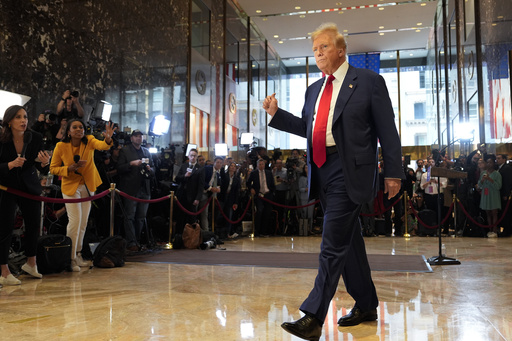
NEW YORK — The recent election victory of Donald Trump has presented a complex dilemma for the judge handling his criminal charges in New York. The pivotal question is whether the judge can proceed with sentencing the president-elect, or if such an action could interfere with his constitutional duties as the leader of the nation.
Documents released on Tuesday indicate that Judge Juan M. Merchan has effectively paused the proceedings until at least November 19, allowing both sides’ legal teams time to assess the next steps. Initially, sentencing for Trump was slated for November 26.
Trump’s attorneys are urging Judge Merchan to prioritize “the interests of justice” and dismiss the conviction, marking the first instance of a former, now future, U.S. president facing criminal charges.
Prosecutors in Manhattan have expressed their desire to navigate a solution that takes into account both the jury’s verdict and Trump’s obligations as president.
Several potential outcomes could arise moving forward:
**Delay until Trump leaves office**
If Judge Merchan wishes to ensure the verdict remains intact while not disrupting Trump’s duties as president, he could postpone sentencing until Trump’s term concludes in 2029. By then, Trump would be 82 and significantly distanced from the events central to the case.
The conviction involves 34 felony counts of falsifying business records, which relate to efforts to conceal a $130,000 payment made during the 2016 campaign in order to settle allegations from adult film actress Stormy Daniels, accusations that Trump denies.
Should the judge elect to wait, it’s uncertain if he will still be presiding by then, as his current term expires well before Trump’s projected departure from office.
**Consider Trump’s immunity request**
Another option for Judge Merchan is to accept Trump’s previous motion to overturn the verdict, following a U.S. Supreme Court ruling in July that conferred broad immunity upon presidents against criminal prosecution. Initially, the judge had intended to make a ruling on this matter before the upheaval stemming from Trump’s election victory.
The Supreme Court ruling provides former presidents immunity during the performance of official duties and prohibits the use of evidence related to official conduct in matters of personal misconduct.
Trump’s legal team claims the prosecution “tainted” the case by including testimony regarding his first term, which they assert should have been excluded. Meanwhile, prosecutors contend that the ruling lacks grounds to disturb the jury’s finding.
The judge holds the authority to order a new trial, potentially occurring after Trump’s term, or altogether dismiss the indictment.
**Await a federal court decision**
Merchan may also choose to hold proceedings until the 2nd U.S. Circuit Court of Appeals rules on Trump’s earlier attempt to transfer the case from state to federal court.
Trump’s attorneys are currently appealing a decision made by a federal judge in Manhattan who denied the request for transfer. Their argument centers on the belief that the case should be in federal court, given that, as a former president, Trump is entitled to assert immunity and pursue dismissal.
However, opting to wait for the appeals court’s ruling may lead to further delays. The court has allocated time until January 13 for prosecutors to respond to Trump’s appeal, one week prior to his scheduled inauguration. Once Trump assumes office, his legal representatives could introduce new arguments concerning presidential immunity.
**Dismiss the case entirely**
Merchan could abruptly resolve the case by annulling Trump’s conviction on the 34 felony counts and dismissing the indictment. This would eliminate sentencing or any associated penalties, protecting the president-elect from potential imprisonment or additional repercussions.
Trump’s lawyers maintain that dismissing the case is essential to prevent any unconstitutional barriers to his governance.
Prosecutors have acknowledged the “unprecedented circumstances” that arise from Trump’s conviction occurring alongside his election but argue that the jury’s decision should remain intact.
**Proceed to sentencing**
Alternatively, Merchan may simply choose to proceed with sentencing without opting for any of the aforementioned actions, provided that there are no appeals lodged by Trump’s legal counsel.
According to law professor Ilya Somin from George Mason University, the outcome regarding whether the case progresses to sentencing is uncertain. If it does advance, it’s likely that “it probably won’t be a prison sentence.”
The charges Trump faces could result in a spectrum of penalties, ranging from fines or probation to a maximum of four years in prison.
Somin suggests that “any prison sentence would likely be blocked or suspended in some form,” although a lighter sentence might not significantly hinder Trump’s capacity to govern.
